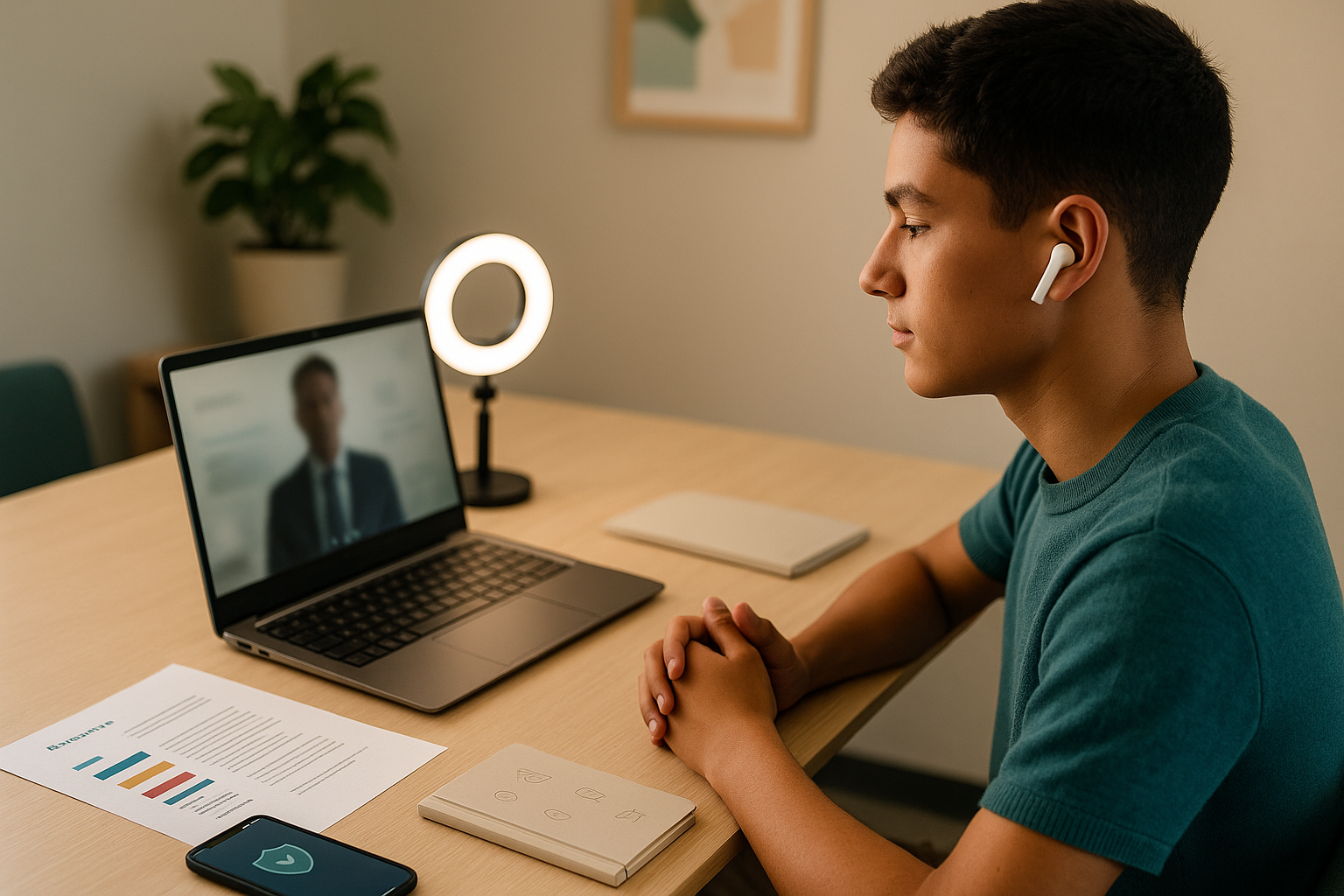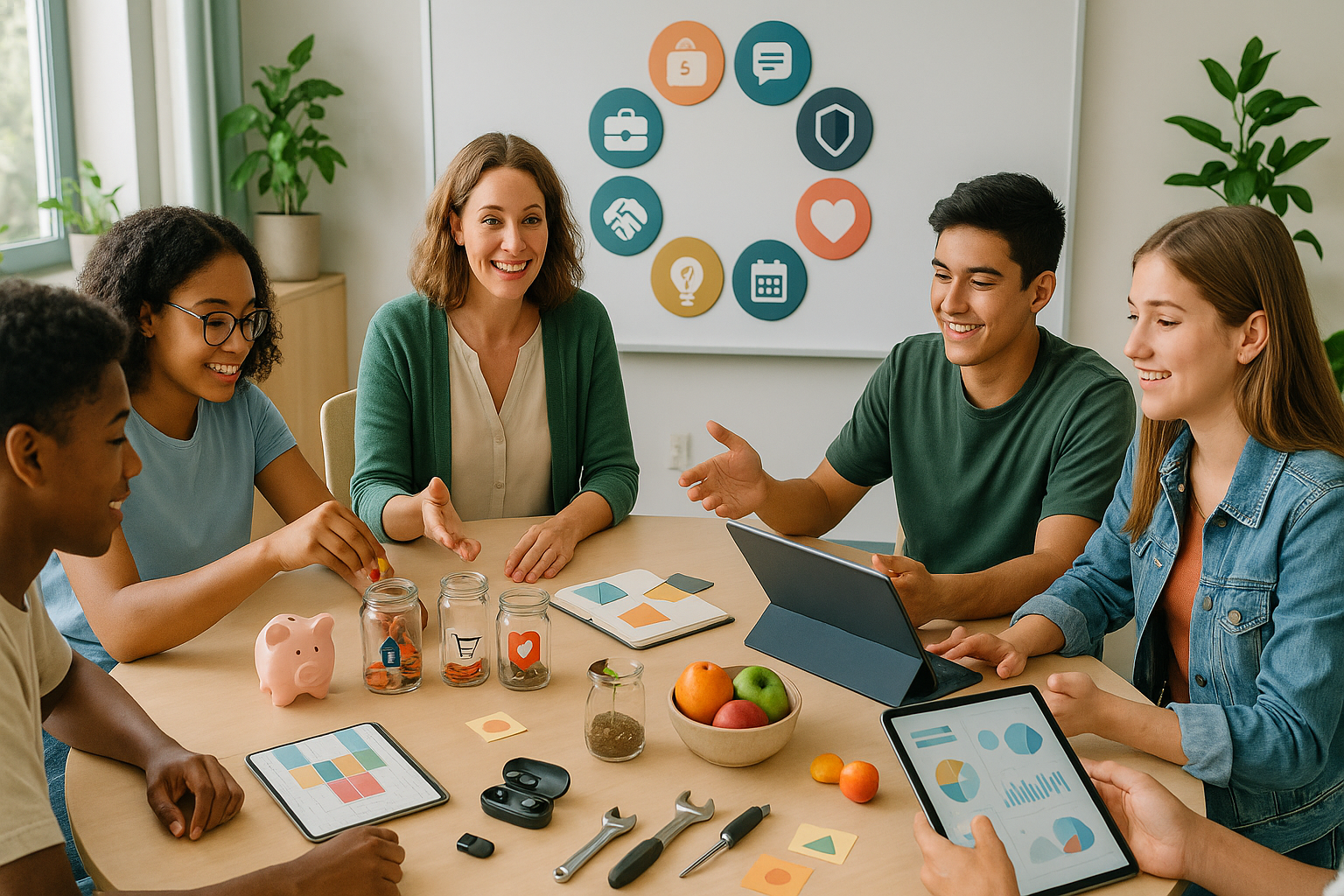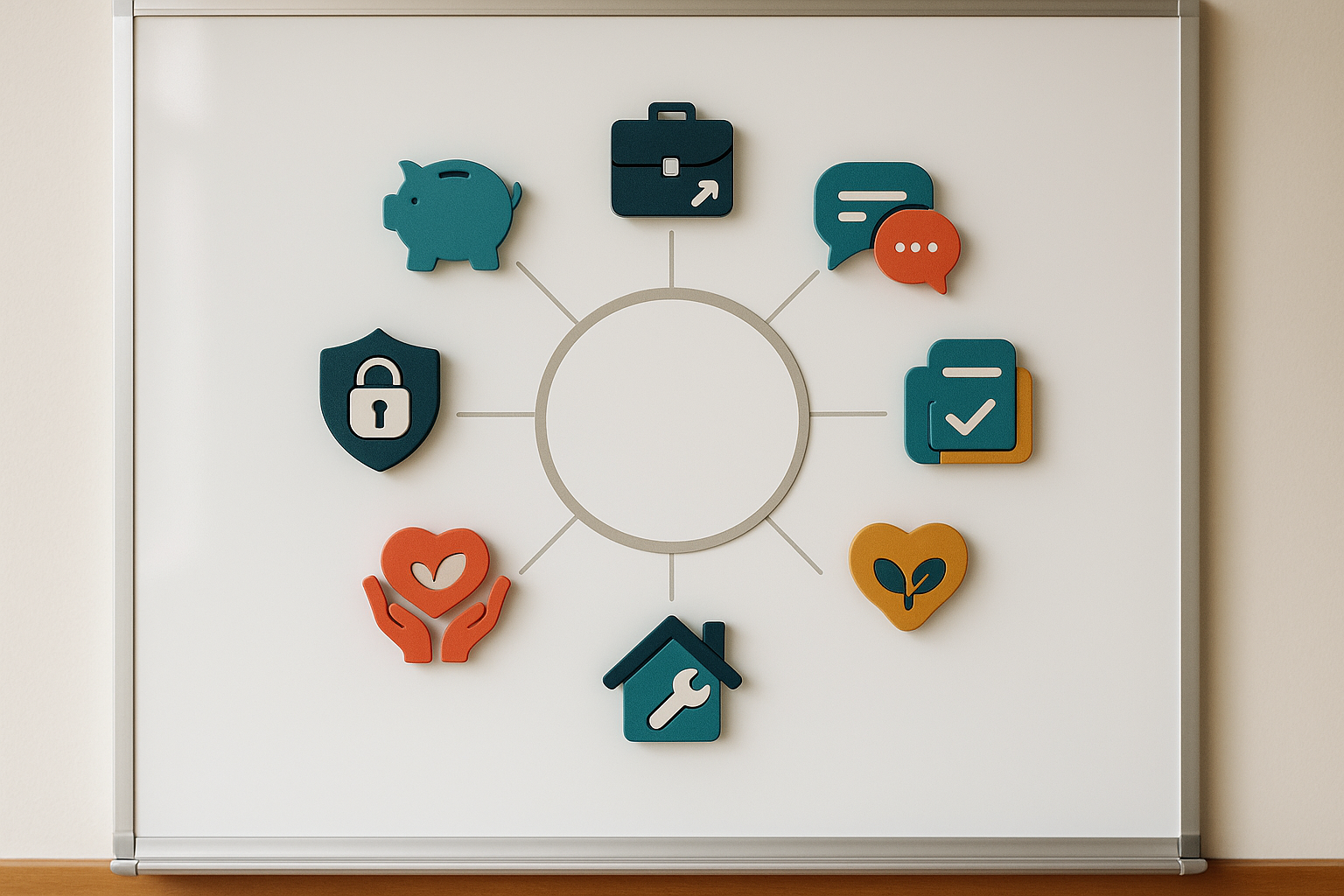Life Skills Curriculum for High School: Building Confidence and Real-World Competencies
A comprehensive life skills curriculum equips high school students with important life skills for navigating adulthood successfully. This curriculum addresses practical knowledge gaps that traditional education often overlooks, from financial literacy skills to emotional intelligence. By integrating these skills into school programs, teachers empower youth to transition confidently into independent living, career paths, and responsible citizenship while building the foundation for lifelong personal growth and helping young adults succeed.
Financial Literacy and Budgeting
Understanding money management fundamentals prepares young adults for financial independence after graduation, reducing stress and promoting long-term stability through money skills lessons.
Understanding Income, Savings, and Expenses
High school students learn to decode paycheck breakdowns including gross income, taxes, and deductions while creating realistic budgeting plans. Understanding compound interest demonstrates how early saving habits multiply wealth over time. Hands-on practice involves tracking personal expenses, calculating take-home pay, and allocating funds across necessities, wants, and savings goals to establish sustainable financial habits before entering the workforce or pursuing higher education.

Avoiding Debt and Building Credit
Credit scores impact housing, employment, and loan opportunities throughout life. Young adults explore responsible credit card usage, understanding interest rates, and recognizing predatory lending tactics through consumer math lessons. Teaching life skills strategies for maintaining debt-free lifestyles includes emergency funds, comparison shopping loan terms, and distinguishing between good debt like higher education investments versus harmful high-interest consumer debt that can trap youth financially.
Career Exploration and Job Readiness
Early career preparation helps high school students align their education with professional goals, making informed decisions about college, training programs, or immediate employment opportunities.
Identifying Interests, Skills, and Goals
Self-assessment tools help young adults discover their strengths, values, and passions through personality tests and skills inventories. Career research methods include informational interviews, job shadowing, and online exploration resources. Youth set achievable post-graduation goals using structured planning frameworks, whether pursuing higher education, vocational training, or direct workforce entry, ensuring their choices align with personal aspirations and skills needed.
Resume Building, Interview Skills, and Professional Etiquette
Step-by-step resume creation teaches high school students to highlight achievements, volunteer work, and transferable soft skills effectively. Mock interviews provide safe classroom environments for answering common questions confidently. Professional etiquette lessons cover punctuality, appropriate workplace attire, email communication skills standards, and networking strategies that help young people make positive first impressions and build valuable professional relationships throughout their careers.

Communication and Interpersonal Skills
Strong interpersonal skills enhance academic performance, personal relationships, and future career success across all industries and life situations.
Verbal and Written Communication
Active listening techniques teach young adults to focus, ask clarifying questions, and respond thoughtfully in conversations. Clear speaking abilities include organizing thoughts, using appropriate vocabulary, and adapting tone for different audiences. Written communication skills cover formal emails, reports, and professional correspondence. Youth practice conveying ideas concisely while maintaining professionalism, preparing them for college applications and workplace communications.
Teamwork, Collaboration, and Leadership
Group projects simulate workplace dynamics where high school students practice dividing responsibilities, meeting deadlines, and achieving shared goals collaboratively. Leadership development includes delegating tasks, motivating peers, and facilitating productive discussions. Young people learn empathy, cultural sensitivity, and respect for diverse perspectives. Conflict resolution techniques help navigate disagreements constructively, teaching compromise and consensus-building essential for successful team environments.

Digital Literacy and Online Safety
Technology skills and digital citizenship prepare youth to navigate online spaces safely while leveraging technology for education and career advancement.
Responsible Social Media Use
High school students learn to curate positive digital footprints that support college applications and job searches rather than hindering opportunities. Cyberbullying risk prevention strategies include recognizing harmful behavior, supporting victims, and reporting incidents appropriately. Critical evaluation abilities help identify misinformation, fake news, and manipulated content. Privacy settings instruction protects personal information from exploitation while maintaining healthy online boundaries.
Basic Cybersecurity and Tech Skills
Password hygiene includes creating strong, unique passwords and using password managers for security. Young adults recognize phishing attempts, suspicious links, and social engineering tactics. Virus protection basics cover antivirus software, safe downloading practices, and regular updates. Cloud storage, collaborative documents, and video conferencing platforms prepare youth for remote learning and modern workplace expectations requiring digital fluency.
Time Management and Organization
Effective scheduling and organizational systems help high school students balance academic demands, extracurricular activities, work responsibilities, and personal life successfully.
Creating Effective Schedules and To-Do Lists
Youth learn to prioritize tasks using urgency-importance matrices, distinguishing between essential deadlines and optional activities. Digital calendar applications, physical planners, and time-blocking techniques help visualize commitments and prevent overcommitment. Breaking large projects into manageable steps reduces overwhelm. Young adults practice allocating appropriate time for studying, recreation, sleep, and social activities to maintain healthy work-life balance.
Goal-Setting and Self-Discipline Techniques
SMART goal-setting frameworks teach high school students to create specific, measurable, achievable, relevant, and time-bound objectives for academic and personal growth. Progress monitoring through regular check-ins maintains motivation and allows adjustments. Procrastination-beating strategies include the Pomodoro Technique, accountability partners, and reward systems. Building self-discipline involves identifying personal triggers, creating productive environments, and developing consistent routines that support long-term success.
Health, Wellness, and Self-Care
Physical and mental wellness education promotes healthy lifestyles that enhance academic performance, emotional stability, and overall quality of life.
Nutrition and Fitness Basics
Balanced meal planning introduces macronutrients, portion control, and budget-friendly healthy eating strategies for youth. Grocery shopping skills include reading nutrition labels, comparing prices, and basic cooking techniques for simple, nutritious meals. Exercise routines accommodate busy school year schedules through quick workouts, active transportation, and recreational sports. Young adults learn how proper nutrition and regular physical activity improve concentration, mood, and energy levels.
Mental Health Awareness and Stress Management
Recognizing anxiety, depression, and stress symptoms empowers youth to seek help before problems escalate. Coping mechanisms include deep breathing, progressive muscle relaxation, and journaling for emotional processing. Mindfulness practices and self-awareness exercises help young people identify triggers and develop personalized stress-reduction strategies. The life skills curriculum normalizes seeking support from counselors, therapists, and trusted adults when facing mental health challenges. See our article on the effects of too much screen time.
Critical Thinking and Problem-Solving
Analytical skills prepare high school students to evaluate information critically, make informed decisions, and solve complex problems creatively throughout life.
Analyzing Situations and Logical Reasoning
Youth practice questioning assumptions, examining evidence quality, and recognizing logical fallacies in arguments and media. Real-world scenarios require evaluating multiple perspectives, weighing pros and cons, and predicting potential outcomes. Creativity exercises challenge conventional solutions, encouraging innovation and flexibility. These problem-solving abilities transfer to academic research, consumer decisions, civic engagement, and professional problem-solving situations young adults will encounter.
Conflict Resolution and Negotiation
Identifying conflict sources helps youth address root causes rather than surface symptoms in disagreements. Calm discussion techniques include using “I” statements, active listening, and finding common ground. Role-playing exercises simulate workplace disputes, roommate conflicts, and family disagreements. Young people practice compromise, win-win solutions, and knowing when to involve mediators, preparing them for constructive conflict resolution throughout personal and professional relationships.
Practical Daily Living Skills
Independent living skills ensure high school students can manage household responsibilities, navigate communities, and handle practical challenges confidently after graduation.
Household Maintenance and Basic Repairs
Cleaning routines teach efficient methods for maintaining hygienic living spaces including kitchen sanitation, bathroom cleaning, and laundry basics. Simple repairs like changing lightbulbs, unclogging drains, and resetting circuit breakers save money and prevent larger problems. Safety protocols cover proper tool usage, electrical precautions, and knowing when professional help is necessary. These life skills promote self-sufficiency and responsible home management.
Transportation and Community Resources
Public transit navigation includes reading schedules, planning routes, and understanding fare systems for buses and trains. Ride-sharing safety covers verifying drivers, sharing trip details, and trusting instincts about uncomfortable situations. Safe driving tips emphasize defensive techniques, maintenance basics, and insurance requirements. Youth discover community free resources like libraries, recreation centers, food banks, and volunteer opportunities that provide support and engagement.
Housing and Renting Essentials
Comparing housing options teaches young adults to evaluate location, amenities, and affordability when selecting apartments or shared housing. Lease agreement comprehension covers terms, deposits, maintenance responsibilities, and tenant rights protecting against exploitation. Budgeting for rent includes calculating affordable amounts, understanding utilities, and planning for unexpected expenses. Roommate agreements address chores, guests, quiet hours, and conflict resolution strategies for harmonious living.
Social-Emotional Learning and Personal Development
Emotional intelligence and personal growth skills foster resilience, healthy relationships, and adaptability essential for navigating life’s challenges successfully.
Building Empathy and Emotional Intelligence
Recognizing emotions in themselves and others helps youth respond appropriately to various social situations and build stronger interpersonal skills. Compassion exercises include perspective-taking activities, volunteer experiences, and discussing diverse life experiences. Active listening and respectful communication across cultural differences promote inclusivity. These interpersonal skills enhance personal relationships, academic collaboration, and future workplace dynamics requiring emotional awareness and interpersonal sensitivity.
Setting Boundaries and Finding Support Systems
Learning to say no protects young adults from overcommitment, peer pressure, and unhealthy relationships that drain energy and compromise values. Identifying trustworthy support networks includes recognizing healthy versus toxic relationships and understanding when professional help is needed. Youth explore free resources like guidance counselors, mentors, support groups, and mental health professionals. Building strong support systems provides stability during challenging transitions and throughout adulthood.
Resilience and Adaptability in a Changing World
Coping strategies for failure include reframing setbacks as learning opportunities, maintaining perspective, and developing bounce-back plans after disappointments. Growth mindset principles encourage viewing challenges as chances to develop new skills rather than insurmountable obstacles. Flexible thinking prepares young people for career pivots, technological changes, and unexpected life events. Lifelong learning habits ensure youth remain adaptable and confident facing future uncertainties.
























